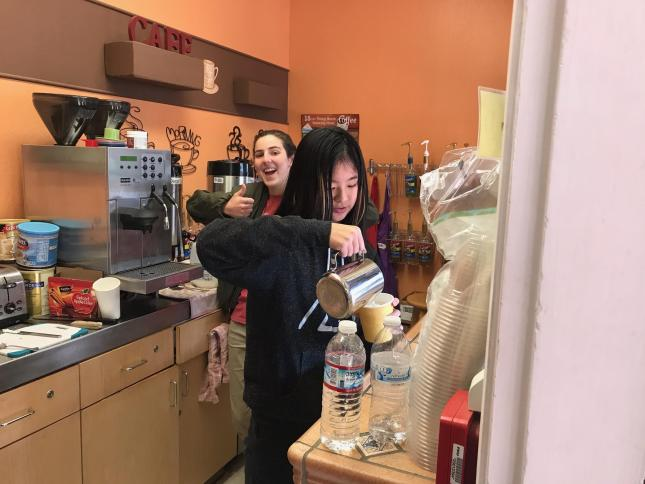Senior Joseph Maggard stood at the end of a checkout conveyor belt at Safeway, watching his coworker ring up a customer. Several feet ahead of him, the cashier wearing latex gloves scanned item after item, occasionally adjusting her mask with the side of her arm. The store was eerily quiet, the occasional sound of shoes squeaking on tile breaking the silence.
For students like Maggard, the sudden switch to a socially distanced job environment has been a significant transition.
Maggard, who began working at the Safeway on Saratoga-Sunnyvale Road in February, saw a visible shift in the dynamic at his workplace starting last spring. During the few weeks after quarantine began, the number of customers at the store dropped drastically, driving business down. However, according to Maggard, workers were still only laid off for normal reasons, even after several months of the lockdown and the strict regulations that were implemented and enforced at his workplace.
But, he said, the situation did have upsides.
“Generally, people are considerably more pleasant and aware, which is a definite plus,” he said.
Maggard is required to wear a mask at all times, and cleaning requirements and regulations have also significantly increased, he said. In addition to regular temperature checkups, there was one official public health checkup at the store in early July.
“Not everyone is so lucky to work in a place where regulations are so closely followed,” Maggard said. “My hope is that everyone working right now is able to stay safe.”
Although most chain retailers continue to see regular customers and employees, many local small businesses have been hit especially hard and some have shut their doors permanently.
Fortunately for senior Stef Poelmann, an assistant general manager at the Brookside Club Of Saratoga, the changes have been modest.
After two years of working as a lifeguard at the swim and tennis club, Poelmann moved into the position of member services in early 2019 and currently helps out with office tasks ranging from answering the telephone, scheduling reservations and ensuring the members are safe and comfortable, all of which have been affected by pandemic restrictions.
While the swimming school continues to remain open, he has witnessed significant policy changes over the past few months.
“As expected, we have a lot less active members coming to the club,” Poelmann said. “The ones who do come need to make reservations for either swimming or playing tennis. This was very new to everyone as we used to have a walk-in policy.”
Another change is that Poelmann is required to take a temperature check, enforce the wearing of masks at the facility, and sanitize the surroundings after a family leaves. Despite the prominent physical modifications at the club, he also emphasized the noticeable shift in the atmosphere.
“While Brookside is regularly a place to socialize and congregate with friends, there can be no congregating of members of separate family units at this time,” Poelmann said. “My job now is a lot about ‘policing’ and less about having fun with other members and colleagues.”
Some student employees are faced in even tougher situations. Due to the restrictions on small businesses, the Saratoga Federated Church Courtyard Cafe has had to place its student employees on unpaid leave. These workers include junior Michelle Jiang and seniors Justin Guo, Isaac Sun, Leslie Sun (not related) and Jessie Zhou.
“For a customer service job, it's been amazingly peaceful and understanding,” said Leslie, the manager of the cafe. “Right now, a lot of us are starting to miss seeing regular customers and the peaceful atmosphere.”
Isaac, who had used the job to pay for private band lessons, found himself stuck in an especially hard position when the church announced the cafe’s closure in March. Though he was able to pick up a job giving private [instrument] lessons, the initial circumstance was hard for him to navigate.
“For the most part I just lost a source of income and it was kind of irritating because I had to pay for my tuba lessons using [gifted money at first],” Isaac said.
Some students, the search for a job in a quarantined world has actually proven successful. Junior Julia Gonzalez got a job working as a Spanish tutor over the summer and has found working remotely to be effective and convenient.
“If the pandemic hadn't happened, I would have been teaching at the Spanish Ahora facility in Campbell,” Gonzalez said. “It was sad not to be able to see everyone because I really am a people person and I couldn't meet the owner and the students in person. However, because of online learning, people from as close as Palo Alto and as far away as Sacramento were able to join.”
During her four months tutoring middle and high school students, Gonzalez was able to connect with them and learn about their different backgrounds, which she said was a “mind-blowing” experience despite being in a virtual environment.
Though student employees have seen their work environments rapidly fluctuate during the pandemic, those who have managed to continue working have gained a greater appreciation for the lingering normality that they still have.
“In these uncertain times, I think I am privileged to have a job,” Poelmann said. “I enjoy the extra responsibilities that the pandemic has put on my work. Beyond making money, it is nice to have a job that provides you a regularity in these awkward times. It gives you a reason to leave the house and cautiously engage with other people.”


























